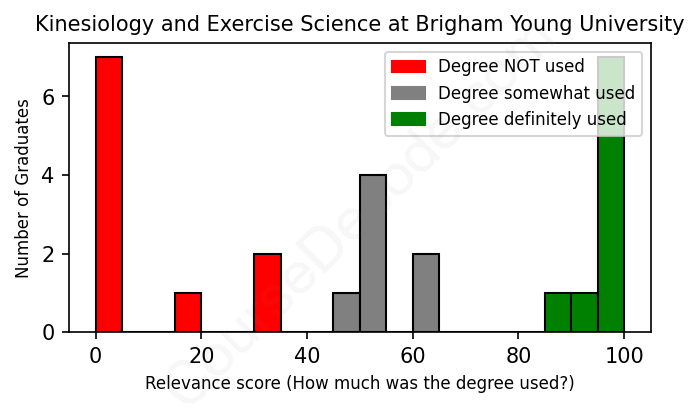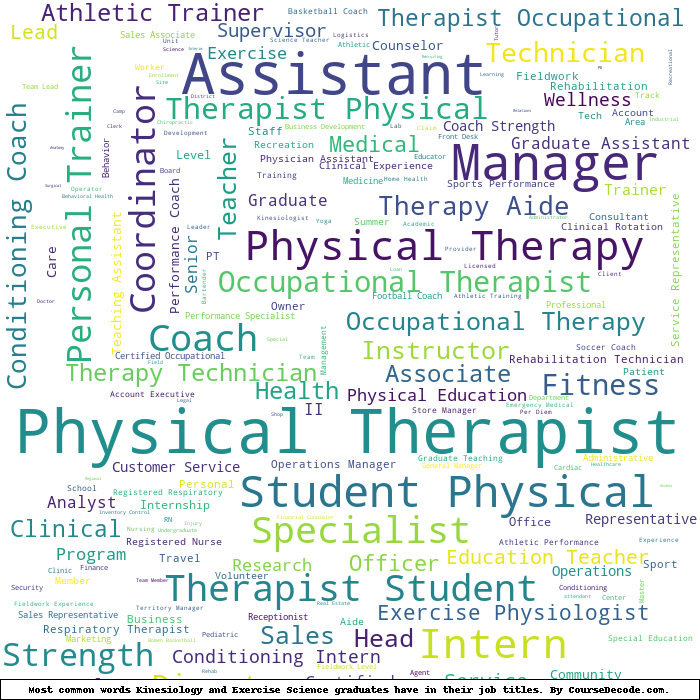
First, some facts. Of the Kinesiology and Exercise Science graduates from Brigham Young University we've analyzed , here's how many have used (or NOT used) their degree in their career:

These are estimates based on AI analysis of 26 LinkedIn profiles (see below).
The verdict? Significantly below average. Overall, with an average relevance score of 51%, Kinesiology and Exercise Science graduates from Brigham Young University have a much lower likelihood (-16%) of finding work in this field compared to the average graduate across all fields:
And for comparison, here's the chart for all profiles we've looked at across all degrees.
Also, after graduating, 61% of these graduates have pursued further education other than another Bachelor's degree (such as a Masters degree or other), compared to the average across all profiles of 35%. This suggests you may need more than just a Bachelors degree to be competitive as a Kinesiology and Exercise Science graduate.
See the details:
|
Relevance score: 50% We think this person has gone into a career only somewhat relevant to their degree. We think this person has gone into a career only somewhat relevant to their degree.
DEGREE INFOGraduated in 2017 from Brigham Young University with a Bachelor's degree in Kinesiology and Exercise Science. Also pursued further education since (see below). JOB HISTORY SINCE GRADUATIONPsychiatric Technician Utah State Hospital Jun 2017 - Nov 2017 FURTHER DEGREES DONE SINCE GRADUATINGDoctor's DegreeMidwestern University (AZ) 2018 - 2022 ABOUTNo information provided. |
The top 10 most common jobs done by the graduates we've analyzed (ranked most common to least) are:
It looks like a bunch of folks who majored in Kinesiology and Exercise Science at Brigham Young University have landed a mix of jobs after graduation, and it’s pretty interesting to see the variety. Many of them have gone into fields like physical therapy and wellness coaching, which are directly relevant to what they studied. Positions such as Physical Therapy Aide, Student Physical Therapist, and Wellness Coach definitely reflect the skills and knowledge they gained in their degree, focusing on human movement, rehabilitation, and fitness promotion. On the flip side, quite a few have taken on roles that are more unrelated, like customer service, sales, and even some medical positions that don’t tie back to kinesiology at all, such as optometrists and dentists. Those jobs might utilize some general health knowledge, but they often don’t require the specific expertise that comes from a Kinesiology and Exercise Science diploma.
Overall, while a significant number of graduates are using their degrees in ways that align closely with kinesiology concepts—like physical therapy or health fitness specialist roles—there's also a notable chunk that veered into completely different territories. It seems like the degree gives a solid foundation for careers in healthcare and fitness, but many ended up in jobs that, while they may borrow some soft skills from the program, don't directly connect to the core lessons of kinesiology. So, if someone is considering this major, it's great for those getting hands-on in physical therapy or wellness, but one should also be open to a wide range of career paths that may or may not align directly with the field.
Here is a visual representation of the most common words in job titles for Kinesiology and Exercise Science graduates (this is across all Kinesiology and Exercise Science graduates we've analyzed, not just those who went to Brigham Young University):

Looking at the career journeys of Kinesiology and Exercise Science graduates from Brigham Young University, it seems like they generally kick off their careers in healthcare and wellness roles, often starting with positions like physical therapy aides, wellness coaches, or even administrative positions in physical therapy settings. Many of the graduates don’t stray far from their field of study; for instance, roles like physician assistants, physical therapists, and sports performance specialists pop up frequently among the profiles. This suggests a solid foundation in Kinesiology leads a good number of graduates directly into relevant and promising careers right out of college.
Fast forward five to ten years, and many of these grads have transitioned into advanced roles. A significant portion has moved into specialized healthcare positions, such as doctors, physical therapists, and even owners of their own fitness businesses. There are also quite a few who have taken their degrees in unique directions—like the optometrist or the sales and operations manager in a life sciences firm—which shows that while some people stick closely to Kinesiology-related jobs, others leverage their degrees to branch out into diverse fields. Overall, it’s a mixed bag, but it’s clear that a lot of these graduates find their way into solid careers that utilize their Kinesiology backgrounds fairly well!
Getting a Bachelor’s degree in Kinesiology and Exercise Science at Brigham Young University can be a mix of challenging and manageable, depending on your interests and background. If you’re passionate about fitness, anatomy, and physical health, you might find the classes engaging, which can make the workload feel lighter. That said, there are definitely some tough science courses in there, like biology and physiology, that can be pretty demanding. Overall, it's not considered one of the hardest degrees out there, but it does require a solid commitment and a genuine interest in the material to really thrive and enjoy the experience. If you’re ready to dive into it, you’ll likely find it rewarding!
Most commonly, in the LinkedIn profiles we've looked at, it takes people 5 years to finish a Bachelor degree in Kinesiology and Exercise Science.
From looking at these graduates from BYU, it seems like there’s a mix of financial outcomes. Some folks, like the foot and ankle surgeons or the endocrinologist, are probably making pretty solid incomes, especially since those careers usually pay quite well. Others starting out in roles like physical therapy aides or wellness coaches might not be rolling in cash just yet, as those positions tend to offer lower pay. It also looks like some have done a bit of a career pivot; a couple of graduates shifted from healthcare roles to operations or management, which can lead to better pay over time. Overall, it seems like some are doing great financially, but others might still be working their way up the ladder. So, it really depends on the specific path they took after graduation!
Here is a visual representation of the most common words seen in the "about" section of LinkedIn profiles who have a Bachelor degree in Kinesiology and Exercise Science (this is across all Kinesiology and Exercise Science graduates we've analyzed, not just those who went to Brigham Young University). This may or may not be useful:

Here are all colleges offering a Bachelor degree in Kinesiology and Exercise Science (ordered by the average relevance score of their Kinesiology and Exercise Science graduates, best to worst) where we have analyzed at least 10 of their graduates: